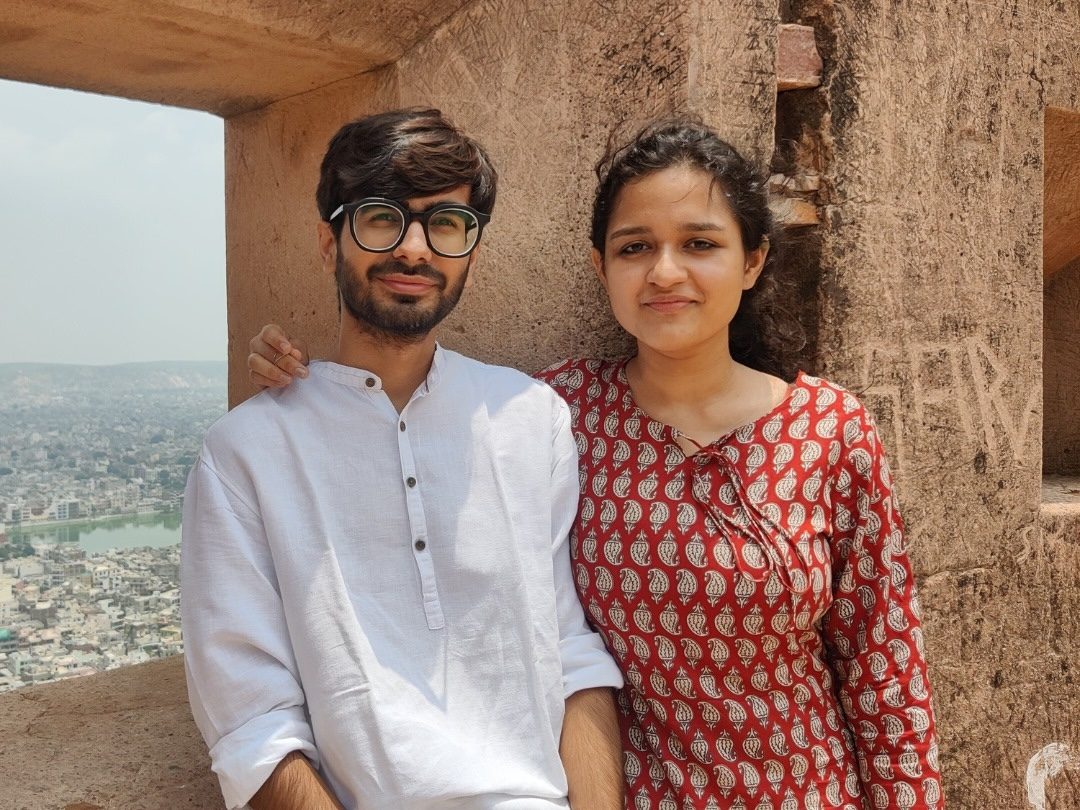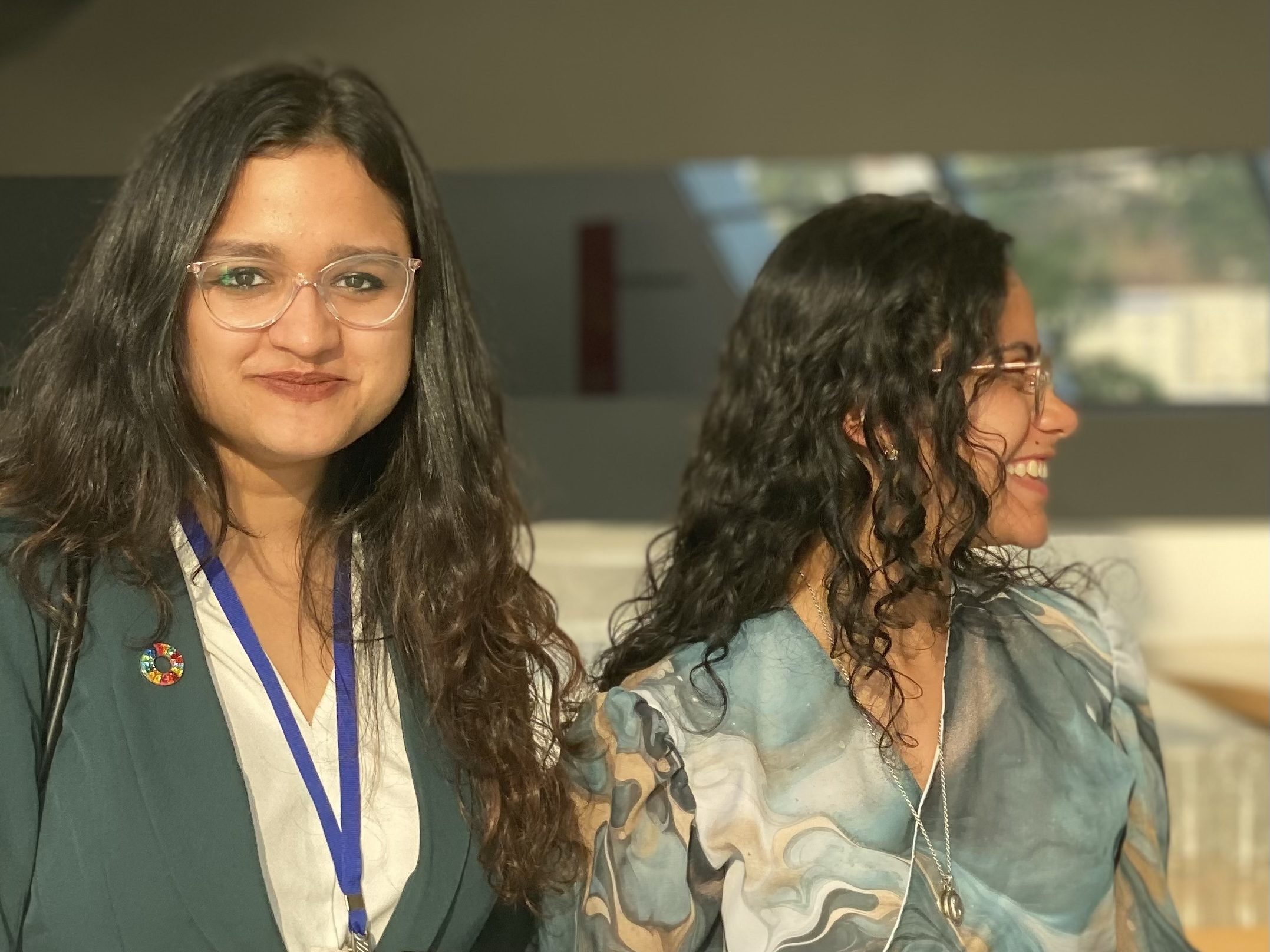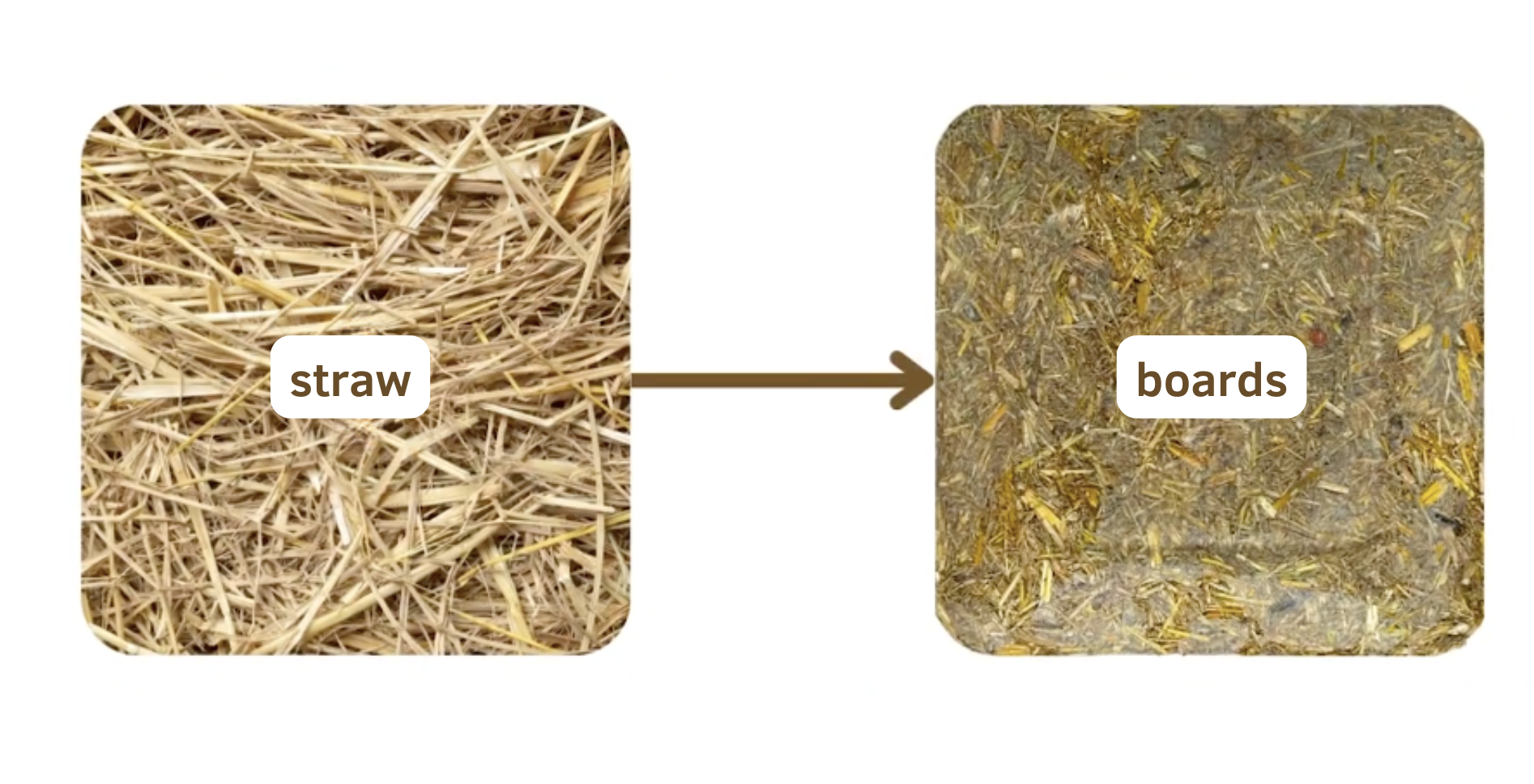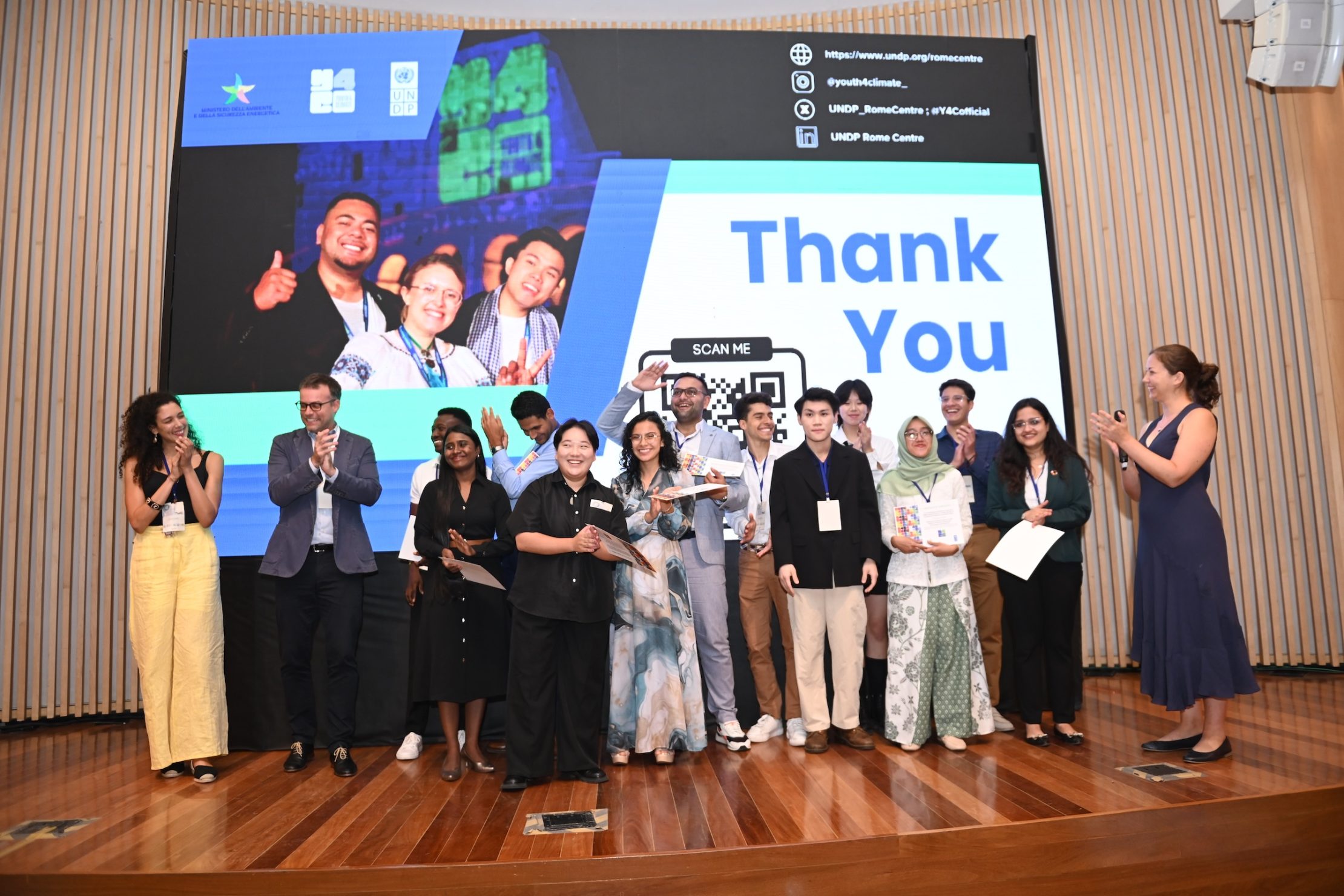
Sanvi Bhutani (right) and Sarthak Ahuja (left) are the founders of Harwaste, a project that upcycles agricultural residue into sustainable construction materials. Photo credit: Harwaste
Every year, as fields in northern India are prepared for new crops, leftover stubble from previous harvests is burned. This widespread practice, concentrated in states like Punjab, Haryana and Uttar Pradesh, creates an environmental and health crisis. The smoke released contains harmful particulate matter, toxins and greenhouse gases, contributing to hazardous smog in cities like Delhi. Beyond the air pollution, stubble burning also depletes soil health, harms biodiversity, wastes water and imposes significant social and economic costs - from increased healthcare expenses to disruptions in daily life.
At the same time, the buildings and construction sector, which is responsible for about 37 percent of global greenhouse gas emissions, continues to contribute significantly to the climate crisis. From the energy-intensive production of materials like cement and steel to waste generation and the operational energy use of buildings, the sector’s carbon footprint is undeniable.
Sanvi Bhutani, an architect from India turned management professional, saw the intersection of these two challenges and founded Harwaste, a project that upcycles agricultural residue, particularly stubble, into sustainable construction materials such as building boards. In doing so, Harwaste helps reduce waste, improve resource efficiency and promote eco-friendly alternatives in the construction sector.
In September 2024, Sanvi was supported by Youth4Climate to participate in the One Planet Network Forum, co-hosted by UNEP and G20 Brazil in Rio de Janeiro. The forum brought together leaders from governments, businesses and civil society to share best practices on sustainable consumption and production and work towards advancing Sustainable Development Goal 12.
We sat down with Sanvi to talk about her work with Harwaste, the challenges she’s navigated and her vision for the future.

Sanvi Bhutani with other Youth4Climate awardees at the One Planet Network Forum at Rio de Janeiro. Photo credit: UNDP Rome Centre
What experiences or moments led you to founding Harwaste?
My motivation is rooted in two key experiences. As an architect in Delhi, I was frustrated by the limited options for truly sustainable building materials. At the same time, living in the city made me witness the severe impact of air pollution, some of it caused by stubble burning in nearby states.
These seemingly separate issues converged for me during one particularly smoggy Delhi winter. I realized we could transform agricultural waste into the sustainable building materials our industry desperately needed. This epiphany catalyzed Harwaste.
Our approach goes beyond just finding a use for agricultural waste or creating greener building materials. We're reimagining relationships between urban and rural areas, between different industries, and between waste and resources. This holistic view drives our work, creating solutions that ripple across multiple sectors and communities.
How does your work contribute to advancing sustainable consumption and production?
Our project contributes to advancing sustainable consumption and production in several ways. We're tackling India's massive agricultural waste issue by transforming it into valuable construction materials, redefining waste as a resource.
Environmentally, we're mitigating harmful pollutants from stubble burning, improving air quality and public health. Economically, we're creating new value chains, providing farmers with an additional income stream and promoting sustainable agricultural practices. In construction, our products drive a shift towards sustainable consumption by offering materials with a significantly lower carbon footprint. Essentially, we're fostering systemic change in how we view and utilize resources, demonstrating how cross-sector innovation can lead to more sustainable consumption and production patterns.

Harwaste turns straw into sustainable construction materials such as building boards. Photo credit: Harwaste
What kind of support do you and other projects like yours need to progress further?
Projects like Harwaste need multifaceted support to reach their full potential. Firstly, financial support is crucial. As a micro-entrepreneur, this was my biggest barrier before receiving the Youth4Climate grant. Adequate funding is essential for research, development, prototyping and scaling operations.
Secondly, we need capacity and knowledge support. As budding green entrepreneurs, we often lack specific expertise to avoid common pitfalls. Mentorship from seasoned professionals who've successfully scaled green businesses can make all the difference. We need access to experts who can provide insights on technical aspects, market dynamics and scaling strategies specific to sustainable innovations.
Lastly, network-building and audience engagement is vital. We need platforms to connect with communities directly affected by our work and to a broader audience of potential partners, customers and suppliers.
You participated in the One Planet Network Forum on reducing inequality and promoting a just transition through sustainable consumption and production. Can you tell us about something that happened at the event that had a significant impact on you?
At the One Planet Network Forum, Tarcila Rivera Zea’s words during a discussion on the uneven impacts of climate change deeply resonated with me. She emphasized that Indigenous women and marginalized communities, who often bear the brunt of climate change, do not want to be passive aid recipients. Instead, they demand to be at the forefront of shaping the solutions that impact their lives.
At Harwaste, we strive to collaborate with farmers in shaping solutions, but this conversation made me reflect on how we can better amplify their role. It’s important to make sure we’re not only respecting their collective knowledge but also empowering their individual voices, ensuring they lead the process, not just participate in it.

Youth4Climate award ceremony for Sustainable Consumption and Production awardees at the One Planet Network Forum in Rio de Janeiro. Photo credit: Vanessa Eyer
What does the support from Youth4Climate mean to you?
The support from Youth4Climate has been truly transformative for Harwaste and our team. It's far more than just financial assistance; it's a catalyst that's propelling our vision forward in multiple ways.
Firstly, this support acts as a powerful enabler. It provides us with the resources and platform to significantly scale up our efforts. We can now invest more in research and development, improve our product offerings, and expand our reach. This means we can work with more farmers, upcycle larger quantities of agricultural waste, and provide sustainable materials to a broader segment of the construction industry. Essentially, it allows us to multiply the positive impact we aim to create.
Secondly, Youth4Climate also opens doors to a larger community. It connects us with like-minded individuals, potential partners, and industry experts who can provide valuable insights and collaborations. This network is great for a start-up like ours, especially in the sustainability sector where collaboration often leads to innovation.
Thirdly, the exposure I received at the One Planet Network Forum has been eye-opening. The conversations I had with various stakeholders from around the world have significantly broadened my perspective. It allowed me to see our project through different lenses, understanding its potential impacts and challenges in a global context.
These interactions have also given me a clearer sense of where we excel and where we need to improve, and this self-awareness is key to both our growth and amplifying our positive impact.
Lastly, and perhaps most importantly, being part of the Youth4Climate global family has reinforced our commitment to creating solutions that are not just environmentally sustainable, but also socially equitable. We're now more focused than ever on ensuring that farmers are not just beneficiaries of our project, but active co-creators of the solution.
We're incredibly grateful for this opportunity and are committed to making the most of it to drive positive change in our communities and beyond.
*
Youth4Climate (Y4C) is a global initiative, launched in May 2022, co-led by the Government of Italy and the United Nations Development Programme (UNDP). The initiative has its Secretariat at the UNDP Rome Centre for Climate Action and Energy Transition , and is supported through the 8x1000 funds of the Italian Buddhist Institute Soka Gakkai.
Y4C brings together existing and new online and offline resources, tools, capacities, partnerships, networks and movements led by and designed for youth, with a strong focus on the implementation of solutions, for a more sustained impact on climate on the ground. It aims to foster an inclusive, safe and enabling environment for youth to lead and partner with other stakeholders on climate action.
For more information about the initiative, visit the Youth4Climate platform.